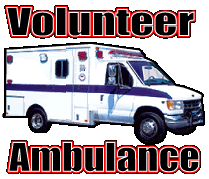 The overall EMS field includes both EMTs and paramedics, among other professional responders.
The overall EMS field includes both EMTs and paramedics, among other professional responders.Officials with hospital systems and emergency responder groups, among others, are hoping for final passage of a bill they say will help reform a fractured, non-uniform system in which not everyone is up to standards, or even working to get there.
A set of standards
Proponents say the bill, whose Assembly version is A2095, would bring New Jersey EMTs, paramedics, the agencies employing them and others under a more streamlined set of professional standards, eliminating inconsistencies that allow some responders to deliver shoddy care. They call it the New Jersey EMS Redesign Bill.
It passed the Assembly in March by a 41-33 vote.
The Senate version (S818) — sponsored by Senators Joseph F. Vitale (D, Middlesex) and Stephen M. Sweeney (D, West Deptford) — was referred to that house's Health, Human Services and Senior Citizens Committee last January but hasn't yet come to the Senate floor for a vote.
Gloucester County EMS Chief Andy Lovell; Dr. Joseph C. Hummel (Emergency Medicine) of Virtua West Jersey Hospital in Camden; Scott A. Kasper, corporate director of EMS for Virtua in Voorhees; and Vincent Robbins, President and CEO of MONOC, a non-profit hospital cooperative based in Neptune, all recently discussed the Redesign Bill, which they say is long-overdue, with the Times.
Lovell heads the squad in which 16 of the county's 24 municipalities, or two-thirds, participate, instead of running their own individual squads or merging with those of neighboring towns.
The four men stressed they're not knocking volunteer EMT squads altogether, and that a large-scale study of New Jersey's system found plenty of room for improvement across caregiver types, as well as in current laws governing them. In fact, they pointed out there are many who abide by regulations, monitor their members and provide excellent care to patients.
The problem, they say, is that some exchange professionalism for a "club" mentality. They balk at existing regulations, officials say, and there is no oversight holding them accountable.
That has resulted in more than a few horror stories, including the following:
* Non-certified members of EMS squads doing things on scenes that only certified EMTs are qualified to do
* Paramedics being called to lift patients and take them to an ambulance because EMTs were too frail or badly conditioned to do so
* EMS squads skipping adjacent squads for mutual aid and relying on more distant ones because of bad blood and rivalries
* Sex offenders successfully joining some squads because their records were overlooked
* EMTs coming to late-night car accident scenes in pajamas and slippers, despite the presence of debris, hardware, blood and other fluids
* Failure to maintain equipment, including ambulances themselves, in a timely way
* Failure to request paramedics on a scene, although the patient's condition may require them
* A lack of data on responses squads have run, leaving authorities in the dark, at least to a degree, concerning possible red flags
What would change
Both EMTs and paramedics need certification, which comes after students complete rigorous courses involving written and practical components.
The Redesign Bill would replace a certificate with a license for EMTs, paramedics, ambulance agencies, hospital facilities receiving patients and other medical responders.
The idea is to create more uniform, enforced minimum standards of care, whatever the agency.
The Office of Emergency Medical Services (OEMS), under the state Department of Health and Senior Services (DHSS), would be the lead agency for all EMS personnel and their dispatchers.
The bill also establishes a state EMS medical director and an Emergency Medical Care Advisory Board to oversee standards.
Licensure would in part give EMTs and paramedics a much-deserved title in a sense, said Robbins, the MONOC president and CEO.
"It's like a permanent recognition of what they've achieved," he explained. "It's like earning a Bachelors or a Masters degree. You have that for life, and no one can take it away."
Nonetheless, responders would have to keep up on continuing education and be held to the standards the lead agency puts into play.
For those who practice in the EMS and other emergency fields, licensure as Robbins puts it is not a lot to ask. The emotional wear and tear builds for EMTs and paramedics, who deal with an array of horrors most never witness.
The state authorities would oversee data collection by responders. They would also apply standards for education and response times to emergency scenes and regulate dispatchers.
The DHSS Commissioner would issue an annual report on EMS issues.
Among other things, the bill would also provide criminal background checks and fingerprinting of all EMS personnel, Global Positioning Systems (GPS) hardware for all ambulances and GPS monitoring software for DHSS.
The New Jersey EMS Coalition, a group supporting the bill, compiled estimates on the additional costs and savings of the bill's provisions, which include a multi-year transition period of putting them into effect, as well as the "thereafter" cost per year.
All-in-all, the Coalition estimates the cost to the state at $1,825,500 to implement and $665,000 per year thereafter. But surplus money from the state police JEMSTAR fund can cover both, the group says.
The county EMS, Virtua and MONOC leaders who spoke to the Times said many groups of professionals are pulling for the Redesign Bill. But many members of a group they say often wields the sheer power of votes — the New Jersey State First Aid Council — has long opposed it.
The Council represents volunteer EMS agencies. Robbins and company said the group is actually divided, with a number of members supporting the bill. But those against it seem to be dominant.
The Council is headed by President Barbara Aras, and under her are three executive vice presidents, one for each of three designated areas — northern, central and southern.























1 comment:
Starting with some history.me and my wife are both emts in ocean county . We work for a paid service that suplys 911 & faculty transport.
As well . We vol. For our town sq.and the town next to it .we devot 52 to 80 hrs. A week to pre hospital health care. At this time the paid portion suports or home . Witch is not easy
I read this and agree with a lot of the bill.
But my majer problem we have is with all this bill making and talk. A big lack of comunication with the small people US.
We are do to resurt. Web have a over aboundence of training ceu.but our teach plain had use completeing cor elect. From 01/12 on. Well core is now not posible and no one noas when it will be .
Witch with out resurt well.. no job
No helping the comunity . And in a very bad economic time for all .
Sussex any no how long we will be in the dark .
Post a Comment